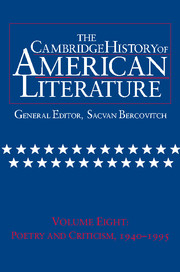Book contents
- Frontmatter
- Introduction
- Poetry, Politics, and Intellectuals
- Introduction
- 1 The Place of Poetry in the Culture, 1945–1950
- 2 Politics
- 3 Rear Guards
- 4 Avant-Gardes
- 5 Authenticity
- 6 Translation
- Conclusion: The Place of Poets, 1995
- Appendix I: Biographies of Poets
- Criticism since 1940
- Chronology 1940–1995
- Bibliography
- Index
5 - Authenticity
from Poetry, Politics, and Intellectuals
Published online by Cambridge University Press: 28 March 2008
- Frontmatter
- Introduction
- Poetry, Politics, and Intellectuals
- Introduction
- 1 The Place of Poetry in the Culture, 1945–1950
- 2 Politics
- 3 Rear Guards
- 4 Avant-Gardes
- 5 Authenticity
- 6 Translation
- Conclusion: The Place of Poets, 1995
- Appendix I: Biographies of Poets
- Criticism since 1940
- Chronology 1940–1995
- Bibliography
- Index
Summary
In the 1960s certain notions of authenticity gathered very great cultural prestige, and not only in the United States. Theodore W. Adorno’s critique of Heideggerian existentialism, The Jargon of Authenticity (1964), claims that German intellectuals produced a jargon based on the premise that moments of present experience are full of special significance and deserve greater esteem than thought or critical analysis. The criterion of authenticity inevitably produces dreams of origins unsullied by historical experience; the Adamic theme in American letters is all about authenticity. Adorno’s book is a useful reminder, though, that this traditional American theme gained surprising currency in Central and Western Europe in the 1960s. Several aspects of American and continental thought came together in what was then recognized as a sensibility for the moment.
Although this sensibility was rapidly and effectively exploited by the mass media, its hold was strongest on the intellectual class. One thinks of the 1960s as the decade of the young; but the times belonged more specifically to those young people whose lives were oriented to the universities. The prestige of notions of authenticity derived from intellectual culture. This is an interesting point, because many of the images then taken to express authenticity did not come from intellectual life. The hunger for authenticity often seemed to express envy of the lives of other classes. Admittedly the many representations of innocent heterosexual love making, in violation of the strictures of legally certifying institutions, were not far from the lives of university students. But acts of individual violence, an other emblem of authenticity, were actually very rare among such people, as was manual labor, and carried similar authority.
- Type
- Chapter
- Information
- The Cambridge History of American Literature , pp. 123 - 159Publisher: Cambridge University PressPrint publication year: 1996
- 1
- Cited by



